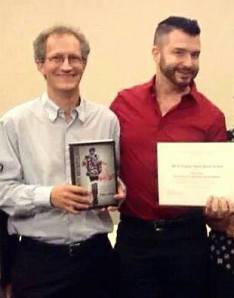Book On Egypt’s Security State (Plus) Wins Award

Richard Schroeder (left) presented Paul Amar with the Charles Taylor book award for “The Security Archipelago” which looks at (among other things) the changing security state, and resistance to it, and its abilities to counter that resistance, in Egypt.
Paul Amar’s book “The Security Archipelago” won the Charles Taylor Book Award at the American Political Science Association convention in Washington, DC, August 28-31.
This prize is for the “best book in political science that employs or develops interpretive methodologies and methods,” and is selected by the Interpretive Methods and Methodologies Section of the APSA.
His new book, “The Security Archipelago” is a fascinating account of the evolution of a network of global security “hot spots” he metaphorically likens to an archipelago, a chain of islands physically and culturally disconnected that nevertheless constitute a system.
In this case, the system is the creation of a new form of security state that combines humanitarian discourse with techniques of surveillance and control.
Certain hot spots serve as laboratories where these emerging forms are tested out. Among these are Brazil and Egypt, and Paul–fluent in Portuguese and Arabic–studies them here with nuanced (dare I say ethnographic?) attention to details of language and body.
The whole book is interesting but the Egypt-relevant chapters include:
- Introduction. The Archipelago of New Security-State Uprisings
- One: Mooring a New Global Order between Cairo and Rio de Janeiro: World Summits and Human-Security Laboratories
- Two: Policing the Perversions of Globalization in Rio de Janeiro and Cairo: Emerging Parastatal Security Regimes Confront Queer Globalisms
- Three: Muhammad Atta’s Urbanism: Rescuing Islam, Saving Humanity, and Securing Gender’s Proper Place in Cairo
and
- Six: Feminist Insurrections and the Egyptian Revolution: Harassing Police, Recognizing Classphobias, and Everting the Logics of the Human-Security State in Tahrir Square 200
and
- Conclusion. The End of Neoliberalism?
I knew of Paul from his book Cairo Cosmopolitan (edited with Diane Singerman) and because he was one of the outside reviewers called on by Indiana University Press to review my book in manuscript form.
I finally met Paul in Oxford, UK a couple of years ago and we had some great conversations. He understands fieldwork, and theory, which is more than I can say for many of my political science colleagues here. I’ve blogged about some of Paul’s work here, and also brought him in as a consultant for my capstone students’ research projects.
Here is the text of the speech read by Robert Adcock of George Washington University who presented Paul with his award:
Paul Amar’s Security Archipelago exemplifies the rich and innovative potential of interpretive methods and methodology in comparative and transnational research. Bringing together events, practices, and discourses in the global cities of Rio and Cairo, from the landmark United Nations summits held in these cities (in 1992 and 1994, respectively) to the present, Amar interweaves fascinating empirical detail and provocative meta-reflection on the trajectories and paradoxes of militarism, humanitarianism and sexuality politics in our global age. His book especially stands out for the Taylor award due to its self-reflexive, creative and confident crafting and pursuit of what Amar terms his archipelago method. With this method Amar brings his cases together in a multitude of ways: from charting similarities and differences between cultural heritage urban planning projects in each city, to exploring implications of the structural position of both cities in semiperipheral states, to following transnational flows of security practices and humanitarian rescue discourses, to persuasively interpreting the two cities as generative sites of new forms of human-security power and governance. Moreover, Amar skillfully integrates his rich array of comparative moves to advance an invigorating metanarrative that aims to displace narratives of neoliberalism with his own novel narrative of a move from liberalization to securitization. This narrative situates the Global South as the center, rather than the recipient or resister, of global trends, and reintegrates events of the 9/11 decade within flows and trajectories that reach from preceding events of the 1990s up to compelling readings of contemporary events, especially the 2011 Egyptian revolution.